Related Research Articles

Tiraspol is the capital of Transnistria, a breakaway state in Moldova, where it is the third largest city. The city is located on the eastern bank of the Dniester River. Tiraspol is a regional hub of light industry, such as furniture and electrical goods production.

Transnistria, officially the Pridnestrovian Moldavian Republic (PMR), is an unrecognised breakaway state that is internationally recognised as part of Moldova. Transnistria controls most of the narrow strip of land between the Dniester river and the Moldovan–Ukrainian border, as well as some land on the other side of the river's bank. Its capital and largest city is Tiraspol. Transnistria has been recognised only by three other unrecognised or partially recognised breakaway states: Abkhazia, Artsakh and South Ossetia. Transnistria is officially designated by the Republic of Moldova as the Administrative-Territorial Units of the Left Bank of the Dniester or as Stînga Nistrului under Russian military occupation.
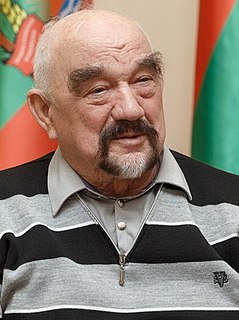
Igor Nikolaevich Smirnov is a Transnistrian politician who served as the first president (1991–2011) of the internationally unrecognized Pridnestrovian Moldovan Republic.

The ruble is the currency of Transnistria and is divided into 100 kopecks. Since Transnistria is a state with limited international recognition and considered as part of Moldova, its currency has no ISO 4217 code. However, unofficially some Transnistrian organisations, such as Agroprombank and Gazprombank, used the code PRB, a code that would otherwise be reserved for Puerto Rico. The Transnistrian Republican Bank sometimes uses the code RUP.
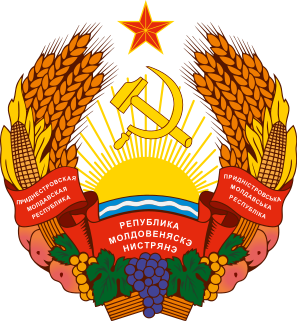
Politics of Transnistria, a de facto independent state situated de jure within the Republic of Moldova in Eastern Europe, takes place in a framework of a semi-presidential republic, whereby the President of Transnistria is head of state and the Prime Minister of Transnistria is head of government. Executive power is exercised by the government. Legislative power is vested in both the government and parliament. Formally, Transnistria has a multi-party system and a unicameral parliament, called the Supreme Council. The president is elected by popular vote. The latest parliamentary elections were held in December 2010; however, they were not monitored by international organizations such as Organization for Security and Co-operation in Europe (OSCE), which has expressed doubts about the level of democracy in the region, and were not recognized by other countries.
Vladimir Yuryevich Antyufeyev, also known under the assumed name Vadim Shevtsov or Vladimir Shevtsov is a former Soviet OMON police officer who was one of organizers of the attempt to overthrow the Latvian government in 1991. As "Vadim Shevtsov", he was later the head of the Ministry of State Security of Moldova's pro-Moscow separatist state of Transnistria between 1992 and 2012. He is a Russian and Transnistrian citizen and was for many years wanted by the law enforcement agencies of Latvia and Moldova. He is no longer wanted by the Latvians however due to their statute of limitations on the type of crime he was alleged to have committed. In July 2014, Antyufeyev became one of leaders of Ukraine's pro-Russia secessionist rebels.
Sheriff is the second-largest company in the unrecognised breakaway state Transnistria. It is based in the city of Tiraspol. Formed in the early 1990s by Viktor Gușan and Ilya Kazmaly, former members of the special services, Sheriff has grown to include nearly all forms of profitable private business in the unrecognised country, and has even become significantly involved in local politics and sport, with some commentators saying that company loyalists hold most main government positions in the territory. Anatoly Dirun, director of the Tiraspol School of Political Studies, stated that "Viktor Gușan is the person with the most influence here, both in politics and economics."
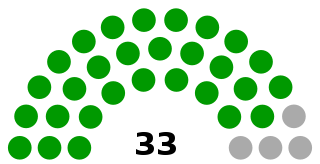
The Supreme Council of the Pridnestrovian Moldavian Republic is the parliament of Transnistria. The unicameral legislature consists of 33 seats, all of which are determined by single mandate constituencies. It is headed by a chairman.
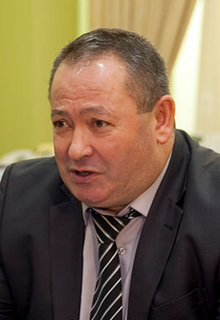
Mikhail Porfirovich Burla is a Transnistrian politician and the chairman of the country's governing political party, Obnovlenie.

The Romanian-language schools in Transnistria are subject to limitations by the government of Transnistria, an unrecognized breakaway region of Moldova since 1992.
The mass media of Transnistria, the breakaway territory within the borders of Moldova, features both state-owned or supported outlets and opposition media. Publications are in Russian, with a single newspaper in each of the other two official languages, Moldovan (Romanian), and Ukrainian.
Oleg Gudymo is a Transnistrian politician who serves as a deputy in the Transnistrian Supreme Council. From 1993 until 2005 he was first deputy minister for national security. He is major general of the Transnistrian Ministry of State Security. He is an ethnic Russian. He has also become a member of the Joint Control Commission for maintaining peace in the zone of the War of Transnistria on 28 December 1992. In December 2005 Gudymo was elected to the Transnistrian parliament and became chairman of the parliamentarian security committee. In April 2007 the Committee for Security, Defense and Peacekeeping merged with the Committee for Law-enforcement Agencies, combating Corruption, Protection of Rights and Freedoms of Citizens, and Gudymo neither became chairman nor member of the new committee.

The Pridnestrovian Moldavian Soviet Socialist Republic (PMSSR), also commonly known as Soviet Transnistria or simply known as Transnistria, was created on the eastern periphery of the Moldavian Soviet Socialist Republic (MSSR) in 1990 by pro-Soviet separatists who hoped to remain within the Soviet Union when it became clear that the MSSR would achieve independence from the USSR and possibly unite with Romania. The PMSSR was never recognised as a Soviet republic by the authorities in either Moscow or Chișinău. In 1991, the Pridnestrovian Moldavian Republic succeeded the Pridnestrovian Moldavian Soviet Socialist Republic.

Crime in Transnistria covers criminality-related incidents in the breakaway Republic of Transnistria, still nominally part of Moldova. The police organisations of Transnistria are tasked with fighting crime in the republic.

This timeline of events is a chronological list of incidents and other notable occurrences related to the War of Transnistria, including events leading up to the war.
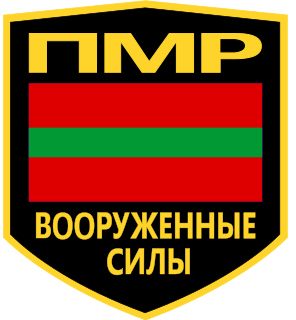
The Armed Forces of the Pridnestrovian Moldavian Republic are the military forces of the unrecognized state of Transnistria. The Armed Forces fall under the leader ship of the Ministry of Defence. The Armed Forces were created on 6 September 1991 to maintain the sovereignty and independence of the Pridnestrovian Moldavian Republic, in accordance with Article 11 of the Republic's Constitution.

Nina Viktorovna Shtanski is a Transnistrian former state politician and public figure. She has been the Deputy Prime Minister for the International Cooperation of the Transnistrian Moldovan Republic and the Minister of Foreign Affairs of the Transnistrian Moldovan Republic from 24 January 2012 to 2 September 2015. Ph.D. (2012). She became an honoured foreign service officer Transnistrian Moldovan Republic in 2012. She held the rank of Ambassador Extraordinary and Plenipotentiary.

Vadim Nikolaevich Krasnoselsky is a Transnistrian politician who is the 3rd and current President of Transnistria. Previously, he served as a member of the Supreme Council of Transnistria from the 7th district, as 6th Speaker of the Supreme Council (2015–2016) and the 7th Minister of the Interior.

The Ministry of Internal Affairs of Transnistria also known as the Ministry of the Interior is an official government agency of the partially recognized Pridnestrovian Moldavian Republic. It is the executive body in implementing defense policies in of the Armed Forces of Transnistria. It is the successor to the Soviet Department of Internal Affairs Pridnestrovian Moldavian Soviet Socialist Republic (PMSSR) The current Minister of Internal Affairs is Major General Ruslan Mova.
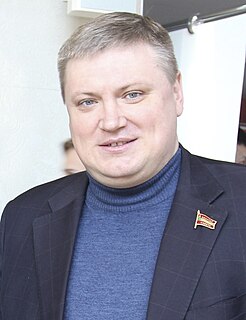
Oleg Olegovich Khorzhan is a Transnistrian politician and convicted felon. Prior to his arrest and imprisonment in late 2018, he served as the chairman of the Pridnestrovie Communist Party and as a member of Transnistria's Supreme Council. He is considered a political prisoner by his supporters and the UPC–CPSU.
References
- 1 2 3 "Tyuryaeva, Ilona Petrovna", The Supreme Council of the Pridnestrovskaia Moldavskaia Respublika. Retrieved 22 November 2017.